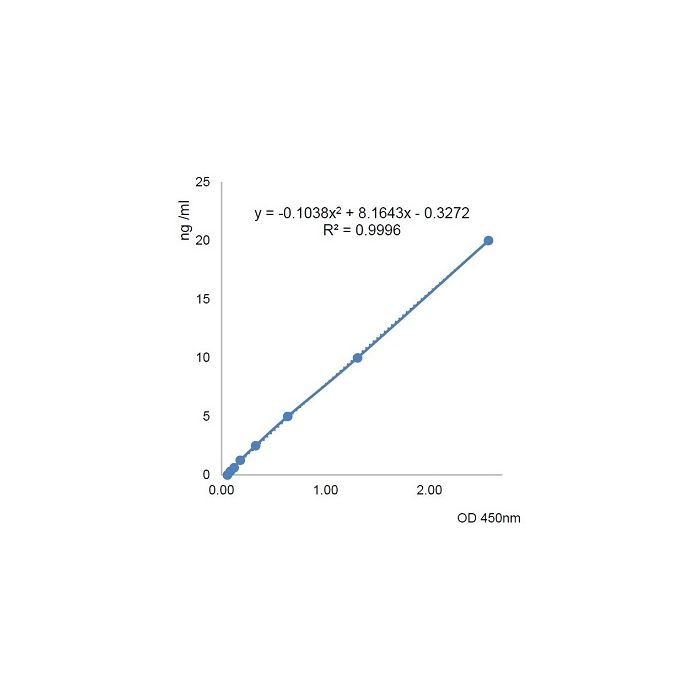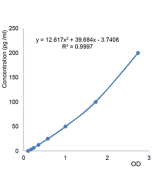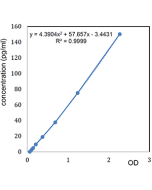Cookie Policy: This site uses cookies to improve your experience. You can find out more about our use of cookies in our Privacy Policy. By continuing to browse this site you agree to our use of cookies.
AdipoGen Life Sciences
B7-H3 [CD276] (human) ELISA Kit

| Product Details | |
|---|---|
| Synonyms | CD276; B7 Homolog 3; 4Ig-B7-H3 |
| Product Type | Kit |
| Properties | |
| Application Set | Quantitative ELISA |
| Specificity |
Detects human B7-H3 (CD276) in serum, plasma and cell culture supernatant. |
| Crossreactivity | Human |
| Quantity |
1 x 96 wells |
| Sensitivity | 0.3ng/ml |
| Range | 0.3125 to 20ng/ml |
| Sample Type |
Cell Culture Supernatant Plasma Serum |
| Assay Type | Sandwich |
| Detection Type | Colorimetric |
| Other Product Data |
UniProt link Q5ZPR3: B7-H3 / CD276 (human) |
| Accession Number | Q5ZPR3 |
| Shipping and Handling | |
| Shipping | BLUE ICE |
| Short Term Storage | +4°C |
| Long Term Storage | +4°C |
| Handling Advice |
After standard reconstitution, prepare aliquots and store at -20°C. Avoid freeze/thaw cycles. Plate and reagents should reach room temperature before use. |
| Use/Stability | 12 months after the day of manufacturing. See expiry date on ELISA Kit box. |
| Documents | |
| Manual |
 Download PDF Download PDF |
| MSDS |
 Download PDF Download PDF |
| Product Specification Sheet | |
| Datasheet |
 Download PDF Download PDF |
B7 family of immunoregulatory proteins is composed of ten members: B7-1 (CD80), B7-2 (CD86), B7-H1 (PD-L1), B7-DC (PD-L2), B7-H2, B7-H3, B7-H4, B7-H5 (VISTA), B7-H6 and B7-H7. B7-H3 (or CD276) is a 316aa long type I transmembrane protein. B7-H3 shares 20-27% amino acid identity with other B7 family ligands. Glycosylated B7-H3 protein has a molecular weight of approximately 100 kDa. A B7-H3 'soluble' isoform has been detected in plasma and B7-H3 is also expressed on exosomes.
B7-H3 is ubiquitously expressed by cells in the non-hematopoietic compartment, such as fibroblasts and epithelial cells, it can be induced on T cells and NK cells. Although B7-H3 expression is elevated in tumors, B7-H3 is also constitutively expressed at higher levels in the liver than in other healthy tissue. B7-H3 mRNA is expressed in most normal tissues, but the B7-H3 protein expression is limited in normal tissues, because of its posttranscriptional regulation by miRNAs. Specifically, miRNA-29 suppresses B7-H3 expression in normal tissues by targeting the B7-H3 3'-untranslated mRNA region.
Little is known about the receptors for these B7-family ligands and their downstream signaling. TLT2 (triggering receptor expressed on myeloid cells-like transcript 2) has been characterized as a putative receptor for B7-H3, but it is dispensable for T cell response, suggesting that other unknown receptors should bind B7-H3. Although receptors remain unidentified, soluble B7-H3 has been shown to bind to CD4+ T, CD8+ T, NK and NKT cells and the extent of its binding is increased upon T cell activation.
B7-H3 inhibits the activation and function of T cells, potently suppressing the proliferation, cytokine production and cytotoxicity of activated T cells. It also inhibits natural killer (NK) cell activation and has a proinflammatory role leading to cytokine release from monocytes and/or macrophages, However, B7-H3 was initially characterized as a co-stimulatory molecule required for optimal promotion of T cell proliferation and cytokine production, which makes the exact role of B7-H3 controversial.
The B7-H3 [CD276] (human) ELISA Kit (Prod. No. AG-45B-0025) detects the soluble human B7-H3 (CD276) protein that is ectopically expressed in various cancers and its levels in serum of patients with cancer suggests it can be used as a noninvasive biomarker for diagnosis, prognosis and/or treatment response.








![CD276 [B7-H3] (mouse):Fc (mouse) (rec.)](https://update.adipogen.com/media/catalog/product/placeholder/default/adipogen_logo_bw_3.png)